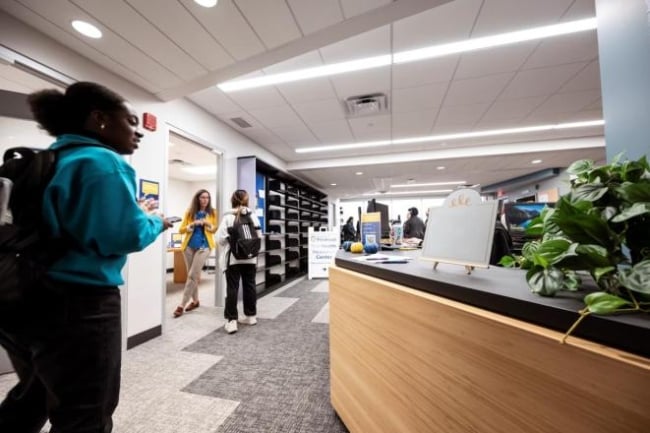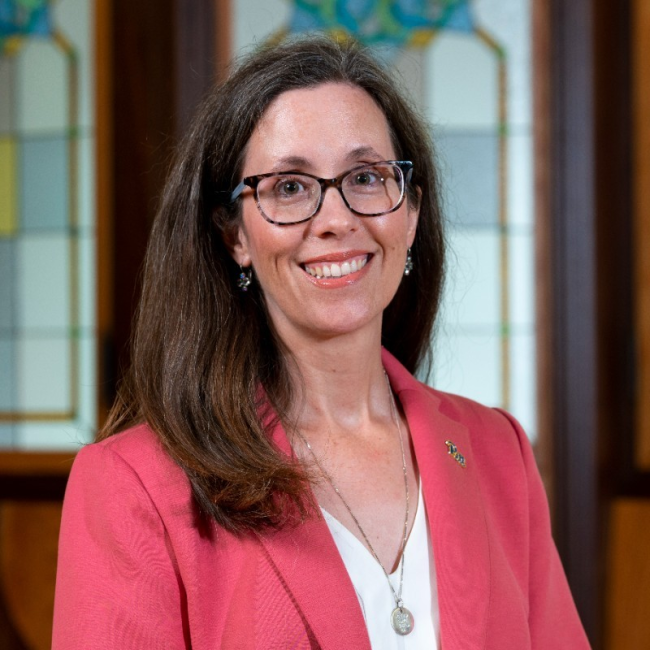You have /5 articles left.
Sign up for a free account or log in.

April Belback has worked with students as director of the Student Success Hub since December 2022.
University of Pittsburgh
University of Pittsburgh leaders worked to close equity gaps in access to resources for its minority—or “at-promise”—students by creating a one-stop shop for advising and resources in a new student success center.
The institution launched its Student Success Hub in November 2022, and April Belback became director of the hub in December.
Belback spoke with Inside Higher Ed about launching the success hub as well as her vision for the hub and student success at Pitt.

April Belback, director of student success at the University of Pittsburgh
University of Pittsburgh
Q: What brought you to the University of Pittsburgh and to this role as director of student success?
A: I came to Pitt about four years ago, in a new role at the institution that sits in the Office of the Provost, to think more broadly about mentoring and advising support for advisers across the institution at our campuses.
At a large R-1 institution like the University of Pittsburgh, we have so many different approaches to advising. One of the first things that I did was called a landscape analysis, to really better understand what was being done in the space of advising at Pitt. Also, for the first time, we worked really intentionally about bringing people together to better talk about advising best practices, make connections where perhaps they weren’t really being made before.
We were also launching, for the first time at Pitt, the Pitt Success Pell Match program and something called the Provost Academy. I knew we were thinking about student success in a brand-new way at the University of Pittsburgh. So I was like, “Hmm, this is exciting, I think I want to come here.”
We were, what I like to say, laying the groundwork for four years in this role, and we were making those connections across the institution. Advising and mentoring is one of our work streams, providing all this professional development and training opportunities for mentors and advisers across the institution, leading efforts with best practices and sharing information. We just felt it was time to launch into student success as well.
Q: What is student success to you?
A: Belongingness is at the heart of what student success means to us at the University of Pittsburgh.
We work with a few researchers who study belonging, and I think we’re still trying to figure it [a definition] out, but I think it’s about a couple of things. It means that a student feels safe on campus. That means that a student finds their person; it means that a student is supported. A student is happy on campus and says, “Pitt is the place where I want to be. I want to go to college, and I feel like I can be myself on this campus.”
Q: What is the Student Success Hub?
A: [The] Student Success Hub builds institutional collaborations … to bring people together, connecting advisers, faculty [and] students in order to reduce equity gaps for our at-promise students. So, yes, we’re looking at things like persistence, retention [and] graduation rates, but more importantly, what we like to think about is student success to build a campus where every student can feel like they belong at the institution.
The Student Success Hub has three distinct programs that we’ve launched or will be launching in the next few months: the Provost Scholars that supports the Provost Academy, the Kessler Scholars and the TRIO McNair Scholars.
But it also serves as a connection and resource space for all students on campus. It’s not just that network—it’s also a place. So we have a place where students can go to find resources, make connections—because we’ve built that groundwork for four years.
Q: What was the need for a facility like this?
A: We’ve developed what we call a research practitioner collaborative, where we look at and where we recognize that the transition to college is stressful for nearly all students. Students move to a new place, where they become disconnected from their network of support. They’re expected to quickly integrate socially and academically to a new context. And we know that this transition can affect anyone, but students from our minoritized and underrepresented backgrounds experienced this stress disproportionately. That can be our first-generation students; that can be our limited-income students and our underrepresented minority students.
[Through] this research practitioner collaborative, we’ve had a couple of different projects over the years, one of which is a Pitt Transition Study, based on something out of the College Transition Collaborative, where we’ve kind of tweaked it to what we were doing here at Pitt for the last several years.
Another is a Program Impact Project that we did for a couple of years. And the data from this Program Impact Project suggests that there was opportunity to increase participation among our at-promise students across our institution.
That was really why we launched the Student Success Hub, because we wanted to scale those resources. We had so many programs at Pitt that were doing such good work … but what we wanted to do was say, “OK, well, you’re doing this amazing stuff, but we can be doing more of it.” Because we were only serving so many students, we wanted to work with the willing, tell them, “Hey, this is awesome. How can we do more of it?”
Q: How does the Student Success Hub serve students, faculty members and staff?
A: In this day and age, academic advisers have so much on their plate; there’s so much work to do. We’ve been asking folks across the institution, “Where’s the gap? What are [you] going to need in this space?” So they’ve been reaching out to us to give us some of these ideas. We’ve been filling the in-between, the holistic pieces, the collaborative pieces of things that folks just don’t have time for.
So we’ve been doing some workshops on skill building, on time management skills for students, doing some outreach around those academic holes.
The other piece is around the in-between time, the transitional time for students, when students move maybe from one academic space to another and they’re just not sure what that looks like yet and they just don’t know where to go, or they’re just not sure. Or they have a question, and they just don’t know who to ask that question to. So the hub is meant to fill in those little gaps for folks around the institution, or maybe even an adviser or faculty member; they don’t know who to find or what. They don’t know who to ask that question to, and so they come to us and we kind of make those connections.
Seeking stories from campus leaders, faculty members and staff for our Student Success focus. Share here.




